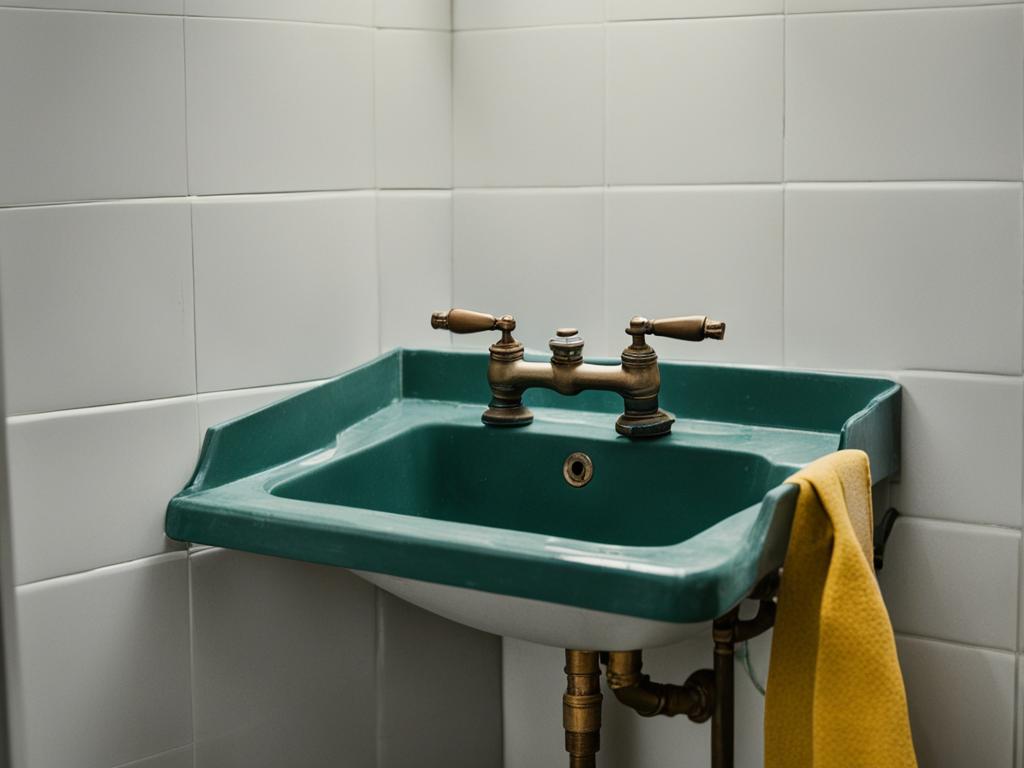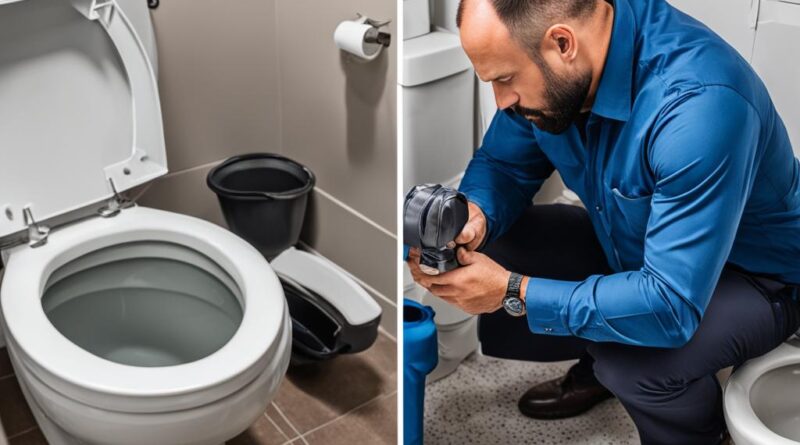Clogged Toilet: Landlord or Tenant Responsibility?
When faced with a clogged toilet in a rental property, determining who is responsible for fixing the issue can be a source of confusion and frustration. In reality, the responsibility for a clogged toilet depends on the terms of the lease agreement between the landlord and the tenant.
If the lease agreement clearly specifies that the landlord is responsible for repairs, then the burden falls on the landlord to resolve the problem promptly. On the other hand, if the lease agreement states that the tenant is responsible for repairs, then the tenant must take appropriate action to fix the clog.
It is essential for both landlords and tenants to understand their respective responsibilities to avoid disputes and ensure a smoothly functioning rental environment. Let’s delve further into the factors that determine who bears the responsibility for a clogged toilet.
Key Takeaways:
- The responsibility for a clogged toilet depends on the terms of the lease agreement between the landlord and the tenant.
- If the lease agreement specifies that the landlord is responsible for repairs, then the landlord must address the issue.
- If the lease agreement designates the tenant as responsible, the tenant must either fix the clog or inform the landlord if unable to resolve it.
- Clear communication between landlords and tenants is crucial in resolving clogged toilet issues promptly and avoiding disputes.
- Collaborative resolution may be necessary in cases where determining responsibility is challenging, such as root problems or plumbing system malfunctions.
Determining Responsibility in the Lease Agreement
When it comes to determining who is responsible for a clogged toilet in a rental property, the lease agreement plays a crucial role. The lease agreement is the first document to consider, outlining the rights and responsibilities of both the landlord and the tenant. To navigate the issue of a clogged toilet, it is important to understand what the lease agreement states regarding repairs and maintenance.
If the lease agreement clearly stipulates that the landlord is responsible for repairs, then it is the landlord’s duty to address any clogged toilet issues. This means that the landlord should take care of the necessary repairs to ensure the toilet is functioning properly.
However, if the lease agreement is silent on the specific responsibility for clogged toilets, state and local laws need to be consulted. These laws may outline general landlord and tenant responsibilities for repairs and maintenance. It is essential to familiarize yourself with these regulations to ensure that both parties are complying with the law and meeting their obligations.
In some cases, the lease agreement may assign the responsibility for maintaining and repairing the rental property, including clogged toilets, to the tenant. This means that the tenant is responsible for resolving any toilet-related issues, either by fixing the problem themselves or by notifying the landlord if they are unable to address it independently.
It is important to note that even if the lease agreement places the responsibility on the tenant, there are limits to what they can be held accountable for. Major plumbing issues, such as clogged toilets due to root problems or plumbing system malfunctions, may fall under the landlord’s responsibility regardless of the lease agreement.
Ultimately, the lease agreement is the primary document that determines who is responsible for a clogged toilet in a rental property. Clear communication and understanding between the landlord and the tenant are essential in addressing any toilet-related issues promptly and efficiently.
Example Lease Agreement Clause:
“The landlord shall be responsible for all necessary repairs and maintenance of the rental property, including but not limited to plumbing fixtures such as toilets. The tenant shall promptly notify the landlord of any clogged toilet issues.”
Comparison of Landlord and Tenant Responsibilities
| Responsibilities | Landlord | Tenant |
|---|---|---|
| Maintenance and repairs | Responsible, unless otherwise specified in the lease agreement | Responsible, if specified in the lease agreement |
| Clogged toilet issues | Responsible if specified in the lease agreement; otherwise, it may vary based on state and local laws | Responsible if specified in the lease agreement; otherwise, it may vary based on state and local laws |
| Notification of issues | Tenants should promptly notify the landlord of any clogged toilet issues | Tenants should promptly notify the landlord of any clogged toilet issues |
Please refer to your specific lease agreement and applicable laws for accurate and detailed information regarding landlord and tenant responsibilities.
Landlord’s Responsibilities for Plumbing Issues
As a landlord, you have certain duties and responsibilities when it comes to maintaining your rental property. One crucial area that falls under your jurisdiction is plumbing issues, including a clogged toilet. It is essential to understand your obligations and ensure a safe and habitable environment for your tenants.
If the lease agreement specifies that you are responsible for repairs, then it is your duty to address a clogged toilet promptly. This means taking the necessary steps to fix the issue, such as hiring a professional plumber or utilizing appropriate methods to unclog the toilet.
By fulfilling your landlord duties for plumbing problems, you not only ensure the well-being of your tenants but also maintain the value of your property in good condition. Promptly addressing plumbing issues can prevent further damage and potential health and safety hazards.
Remember, it is crucial to have a lease agreement that clearly outlines the responsibilities of both parties regarding repairs and maintenance. Open communication with your tenants can also help prevent misunderstandings and ensure that plumbing issues are promptly reported and resolved.
Now, let’s take a closer look at the different responsibilities and obligations of tenants when it comes to toilet maintenance in the next section.
Landlord’s Responsibilities for Plumbing Issues
| Responsibilities | Description |
|---|---|
| Maintaining safe and habitable living environment | Ensuring plumbing fixtures, including toilets, are in good working condition |
| Addressing clogged toilets | Taking necessary steps to unclog toilets, such as hiring a plumber |
| Preventing further damage | Addressing plumbing issues promptly to avoid additional problems |

Tenant’s Responsibilities for Toilet Maintenance
Tenants play a crucial role in maintaining the cleanliness and functionality of their rental property, including the proper use and maintenance of toilets. As a tenant, it is your responsibility to comply with the terms of the lease agreement and ensure that the toilet is well-maintained to prevent clogs and other plumbing issues.
If the lease agreement specifies that the tenant is responsible for repairs under a certain dollar amount, it means that you must take care of a clogged toilet yourself. This includes using a plunger or an appropriate drain cleaner to unclog the toilet. However, if you are unable to resolve the issue on your own, it is important to notify your landlord as soon as possible for further assistance.
Proper toilet maintenance involves taking preventive measures to minimize the risk of clogs. Avoid flushing large amounts of toilet paper, feminine hygiene products, wipes, or any other items that are not designed to be flushed. Additionally, being mindful of what goes down the drain and regular cleaning can help to keep the toilet in good working condition.
“It is vital for tenants to understand their responsibilities when it comes to toilet maintenance. Taking care of clogs promptly and responsibly not only benefits the tenant’s comfort and convenience but also contributes to maintaining a harmonious landlord-tenant relationship.” – John Anderson, Property Management Expert
By fulfilling your tenant responsibilities for toilet maintenance, you can help prevent clogs and ensure a properly functioning toilet throughout your tenancy. Open communication with your landlord regarding any maintenance concerns is essential for prompt resolution of any plumbing issues you may encounter.
Key Tenant Responsibilities for Toilet Maintenance:
- Comply with the terms of the lease agreement
- Use the toilet properly and avoid flushing inappropriate items
- Take immediate action to address minor clogs with a plunger or appropriate drain cleaner
- Notify the landlord if unable to resolve the issue independently
- Maintain open communication with the landlord regarding any plumbing concerns
Collaborative Resolution of Clogged Toilets
In some cases, determining the legal responsibility for a clogged toilet can be challenging. Instances involving issues beyond the tenant’s control, such as root problems or plumbing system malfunctions, can complicate the matter. When faced with such situations, a collaborative approach between the landlord and the tenant is often necessary to find a resolution.
This collaborative resolution can take various forms, including sharing the costs of repairs or working together to identify a solution that ensures the toilet is successfully unclogged.
| Collaborative Resolution Strategies | Advantages |
|---|---|
| Splitting the cost of repairs |
|
| Seeking professional assistance together |
|
| Collaborating on preventive measures |
|
By working together, both the landlord and the tenant can contribute to resolving clogged toilet issues more efficiently and prevent potential disputes. Effective communication and a willingness to find common ground are key in reaching a positive outcome.

Conclusion
The responsibility for a clogged toilet in a rental property ultimately lies in the hands of both the landlord and the tenant. It all comes down to the terms and conditions outlined in the lease agreement. This document serves as a crucial reference point for determining who is responsible for repairs when a toilet gets clogged. It is essential for both parties to have a clear understanding of their roles and obligations to avoid potential conflicts and disputes.
When the lease agreement is specific about the landlord’s responsibilities for repairs, it is the landlord’s duty to address a clogged toilet promptly. On the other hand, if the tenant is responsible for repairs, they should take appropriate measures to unclog the toilet or promptly inform the landlord if they are unable to resolve the issue independently. Proper communication between the landlord and tenant is crucial in these situations.
However, there may be cases where the lease agreement does not clearly define the responsibility for a clogged toilet. In such instances, it becomes necessary to refer to state and local laws to determine the appropriate course of action. Collaborative problem-solving and open communication between the landlord and the tenant are essential to swiftly resolve any disputes that may arise from a clogged toilet or unclear lease agreements related to plumbing issues.
FAQ
Who is responsible for a clogged toilet, the landlord or the tenant?
The responsibility for a clogged toilet depends on the terms of the lease agreement between the landlord and the tenant. If the lease agreement specifies that the landlord is responsible for repairs, then the landlord must take care of the issue. However, if the lease agreement specifies that the tenant is responsible for repairs, then the tenant must take care of the issue themselves or notify the landlord if they are unable to fix the problem.
How can I determine responsibility for a clogged toilet in the lease agreement?
The lease agreement is the first document to consider when determining who is responsible for a clogged toilet. If the lease agreement specifies that the landlord is responsible for repairs, then the landlord must take care of the issue. If the lease agreement is silent on this issue, state and local laws need to be consulted. In some cases, the tenant is responsible for maintaining and repairing the property, including clogged toilets, if the lease agreement specifies so.
What are the landlord’s responsibilities for plumbing issues like a clogged toilet?
Landlords have the responsibility to maintain a safe and habitable living environment, which includes ensuring that plumbing fixtures, such as toilets, are in good working condition. If the lease agreement specifies that the landlord is responsible for repairs, then the landlord must take care of a clogged toilet by hiring a plumber or using other appropriate methods.
What are the tenant’s responsibilities for toilet maintenance and a clogged toilet?
Tenants have the responsibility to comply with the lease agreement and maintain the rental property’s cleanliness and safety, including the proper use and maintenance of toilets. If the lease agreement specifies that the tenant is responsible for repairs under a certain dollar amount, then the tenant must take care of a clogged toilet themselves. However, if the tenant is unable to fix the problem, they should notify the landlord for further assistance.
How can clogged toilet disputes be resolved between landlords and tenants?
In some cases, it may be difficult to determine who is responsible for a clogged toilet, especially when it arises from issues beyond the tenant’s control, such as root problems or plumbing system malfunctions. In such situations, collaboration between the landlord and the tenant may be necessary to find a resolution. This could involve sharing the costs of repairs or working together to find a solution that ensures the toilet is unclogged.
What is the conclusion regarding landlord and tenant responsibilities for clogged toilets?
The responsibility for a clogged toilet in a rental property depends on the terms of the lease agreement between the landlord and the tenant. The lease agreement is the primary document that determines who is responsible for repairs. If the lease agreement is unclear, state and local laws need to be considered. Clear communication between the landlord and the tenant is essential to addressing clogged toilet issues promptly and avoiding disputes.

